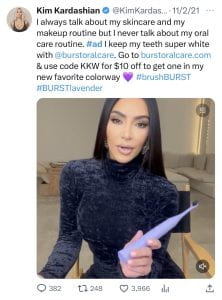 The sweeping transformation of social media platforms over the past several years has given rise to convenient and cost-effective advertising. Advertisers are now able to market their products or services to consumers (i.e. users) at low cost, right at their fingertips…literally! But convenience comes with a few simple and easy rules. Influencers, such as, athletes, celebrities, and high-profile individuals are trusted by their followers to remain transparent. Doing so does not require anything difficult. In fact, including “Ad” or “#Ad” at the beginning of a post is satisfactory. The question then becomes, who’s making these rules?
The sweeping transformation of social media platforms over the past several years has given rise to convenient and cost-effective advertising. Advertisers are now able to market their products or services to consumers (i.e. users) at low cost, right at their fingertips…literally! But convenience comes with a few simple and easy rules. Influencers, such as, athletes, celebrities, and high-profile individuals are trusted by their followers to remain transparent. Doing so does not require anything difficult. In fact, including “Ad” or “#Ad” at the beginning of a post is satisfactory. The question then becomes, who’s making these rules?
The Federal Trade Commission (FTC) works to stop deceptive or misleading advertising and provides guidance on how to go about doing so. Under the FTC, individuals have a legal obligation to clearly and conspicuously disclose their material connection to the products, services, brands, and/or companies they promote on their feeds. The FTC highlights one objective component to help users identify an endorsement. That is, a statement made by the speaker where their relationship with the advertiser is such that the speaker’s statement can be understood to be sponsored by the advertiser. In other words, if the speaker is acting on behalf of the advertiser, then that statement will be taken as an endorsement and subject to guidelines. Several factors will determine this, such as compensation, free products, and the terms of any agreement. Two basic principles of advertising law apply to all types of advertising in any media. They include 1) a reasonable basis to evidence claims and 2) clear and conspicuous disclosure. Overall, the FTC works to ensure transparent sponsorship in an effort to maintain consumer trust.
The Breakdown—When, How, & What Else
Influencers  should disclose when they have a financial, employment, personal, or family relationship with a brand. Financial relationships do not have to be limited to money. If for example, a brand gives you a free product, disclosure is required even if you were not asked to mention it in a post. Similarly, if a user posts from abroad, U.S. law still applies if it is reasonably foreseeable that U.S. consumers will be affected.
should disclose when they have a financial, employment, personal, or family relationship with a brand. Financial relationships do not have to be limited to money. If for example, a brand gives you a free product, disclosure is required even if you were not asked to mention it in a post. Similarly, if a user posts from abroad, U.S. law still applies if it is reasonably foreseeable that U.S. consumers will be affected.
When disclosing your material connection to the brand, make sure that disclosure is easy to see and understand. The FTC has previously disapproved of disclosure in places that are remote from the post itself. For instance, users should not have to press “show more” in the comments section to see that the post is actually an endorsement.
Another important aspect advertisers and endorsers should consider when disclosing are making sure not to talk about items they have not yet tried. They should also avoid saying that a product was great when they in fact thought it was not. In addition, individuals should not convey information or produce claims that are unsupported by actual evidence.
However, not everyone who posts about a brand needs to disclose. If you want to post a Sephora haul or a Crumbl Cookie review, that is okay! As long as a company is not giving you products for free or paying you to sponsor them, individuals are free to post at their leisure, without disclosing.
Now that you realize how seamless disclosure is, it may be surprising that people still fail to do so.
Rule Breakers
In Spring 2020 we saw an uptick of social media posts due to the fact that most people abided by stay-at-home orders and turned to social media for entertainment. TikTok is deemed particularly addictive, with users spending substantially more time on it over other apps, such as Instagram and Twitter.
TikTok star Charlie D’Amelio spoke positively about the enhancement drink, Muse in a Q&A post. She never acknowledged that the brand was paying her to sponsor their product and failed to use the platform’s content enabling tool which makes it even easier for users to disclose. D’Amelio is the second most followed account on the platform.
drink, Muse in a Q&A post. She never acknowledged that the brand was paying her to sponsor their product and failed to use the platform’s content enabling tool which makes it even easier for users to disclose. D’Amelio is the second most followed account on the platform.
The Teami brand found itself in a similar position when stars like Cardi B and Brittany Renner made unfounded claims that the wellness company made products that resulted in unrealistic health benefits. The FTC instituted a complaint alleging that the company misled consumers to think that their 30-day detox pack would ensure weight loss. A subsequent court order prohibited them from making such unsubstantiated claims.
Still, these influencers hardly got punished, but received a mere ‘slap on the wrist’ for making inadequate disclosures. They were ultimately sent warning letters and received some bad press.
Challenges in Regulation & Recourse
Section 5(a) of the FTC Act is the statute that allows the agency to investigate and prevent unfair methods of competition. It is what gives them the authority to seek relief for consumers. This includes injunctions and restitution and in some cases, civil penalties. However, regulation is challenging because noncompliance is so easy. While endorsers have the ultimate responsibility to disclose their content, advertising companies are urged to implement procedures that make doing so more probable. There are never-ending amounts of content on social media to regulate, making it difficult for entities like the FTC to know when rules are actually being broken.
Users can report undisclosed posts through their social media accounts directly, their state attorneys general office, or to the FTC. Private parties can also bring suit. In 2022, a travel agency group sued a travel influencer for deceptive advertising. The influencer made false claims, such as being the first woman to travel to every country and failed to disclose paid promotions on her Instagram and TikTok accounts. The group seeks to enjoin the influencer from advertising without disclosing and to engage in corrective measures on her remaining posts that violate the FTC’s rules. Social media users are better able to weigh the value of endorsements when they can see the truth behind such posts.
In a world filled with filters, when it comes to advertisements on social media, let’s just keep it real.

